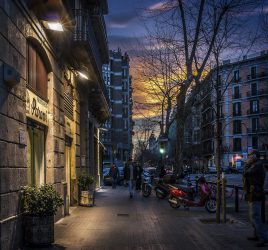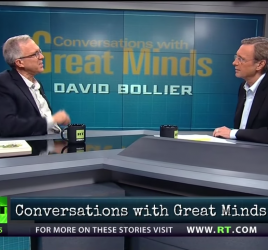Silke Helfrich on the Commons as a way of working and living together
“In a way we need to stop looking for definitions of the commons as a notion, as a concept. Because in fact it’s not about a thing. It’s not about a concept. It’s not about something separated from us. It’s another way of being in the world. It’s another way of thinking about the world, and thus another way of constantly reshaping and reconstructing the world.”
Silke Helfrich of Commons Institute and the Commons Strategies Group was interviewed by members of Zemos98 during last November’s European Commons Assembly in Brussels.
Video Transcript
My name is Silke Helfrich. I’m from Germany, and I am with the Commons Institute in Germany, which is a network of people who think about the commons, and think about how the idea of the commons transforms our way of being — of living together and working together. And I’m also with the Commons Strategies Group, which is a small group of three independent international activists, scholars and authors on the commons.
In a way we need to stop looking for definitions of the commons as a notion, as a concept. Because in fact it’s not about a thing. It’s not about a concept. It’s not about something separated from us. It’s another way of being in the world. It’s another way of thinking about the world, and thus another way of constantly reshaping and reconstructing the world.
We should better talk about “commoning” instead of commons. And having said this, commoning means being aware that plenty of the resources we need to make a living, don’t belong to individuals, need to be shared with other people. And that need to share resources requires skills: of sharing; of knowing how to do it; of managing shared resources. So commoning is about taking responsibility for common stewardship of resources, processes, spaces and the time we have available together.
It’s a practice: talking about the commons is talking about social practices that enable us to build (I would say) a free, fair and sustainable future. Because if we have one political challenge ahead, it is basically coming up with proposals, and concrete social practices, that help us merging three core ideas of political traditions. Which is: Freedom: the enhancement of ourselves, so to say, but freedom in relatedness to others, because we are not isolated human beings in this world; it is Equity — so we all need fair share in this world which at the same time a fair share is building a safer world; and is the notion of Sustainability, because, as the Greens used to say, we only borrowed this world from our grandchildren, right? So I think that the political project of the commons is to bring these three notions of (usually) different political traditions together: Fairness, which is kind of a very socialist idea; Freedom, which is a very liberal idea; and Sustainability, which is a very green idea.
The thing I enjoyed the most, in this starting process of Commons Assembly in Europe, is that all of us involved in this, got aware of how many we actually are. Because one tends to feel isolated as a commoner, right? Because obviously the way we think, the way we do, the way we work; the proposals we make; are not really on top of the political agenda. And if they are on top of the political agenda then as enclosures of the commons — that it separating people from the resources they need to make a living, or enclosing, privatizing what has been held in common etc. etc. So it has been empowering for us to see so many people all over Europe working, perhaps with different words, and in different realms of action, and certainly in different countries and locations, on a kind of common agenda. So it’s a moment of power, through, simply, coming together and sharing our experiences.
If you really want to challenge the political agenda, which today is an agenda of enclosing the commons, denying access to common resources to people, of market fundamentalism with a consequence of rising nationalism — right wing nationalism — I think that the dimension of the challenge we have had is that we need to flip the whole narrative. So it is not about doing an amendment of concrete laws here and there. It’s not about making another policy proposal which will have tough times to get channelled through the political institutions. It is about commonizing the way we do politics. It is about rethinking politics and rethinking democracy. Because if it is representative democracy, tied to, locked into, extremely structured, and so to say un-free, political processes (as we’ve heard yesterday as well, when we have been introduced to the processes in the European Parliament) then it is pretty clear that what the commons system needs the most which is: conversation; deliberation; time for people, and space for people to figure out how they can resolve their own problems in their very concrete contexts. So perhaps the most important thing decision-makers and policymakers can do for us, is provide support: recognize our right for self-organization; provide support, space, and financing for opening spaces, for a kind of deliberative democracy where people resolve their own problems, because they are the ones who know their situation best; and provide them with the tools to do so, and support them with finding their own solutions. And so it’s flipping the whole narrative, rethinking the very fundaments and the very categories policymaking is based upon today; and rethinking and challenging the dominant notion of democracy — of representative democracy.
I would like to make a call, because I think that in essence the whole idea of the commons is raising awareness that common people usually do uncommon things. And having said that, it’s also pretty clear that a sound message around the commons will be a simple message around the commons, in plain language that really speaks to people’s hearts. And sometimes it seems to me that we, as commoners, who try to theorize, conceptualize and make sense of the complexity out there, are not able to speak that plain and simple language. So I want to make a call to all those creative people out there, who know how to speak to people’s hearts — because it’s about all of us. Each of us out there has a stake in the commons. It’s about raising awareness about what we are already doing, already creating, to create a free, fair and sustainable society. So let’s build a huge coalition between all the commoners in Europe, and communication designers, and people who can help us getting the message across.
Transcript by Simon Grant. Thanks Simon!


